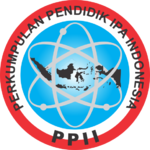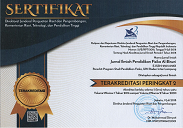Pedagogical content knowledge of pre-service physics teachers
Abstract
This study aims to describe the content knowledge, pedagogical knowledge, and pedagogical content knowledge of students of pre-service physics teachers at Walisongo Semarang. The type of research is quantitative descriptive. The samples were Physics Pre-service teachers at Universitas Islam Negeri Walisongo Semarang. The samples were 65 pre-service physics teachers determined by the purposive sampling technique. The method of collecting data used was a test, observation, and documentation. The results showed that pre-service physics teachers' content knowledge capabilities were in three categories, namely: 35% poor, 42% sufficient, and 23% good. The pedagogical knowledge test showed that 16% of physics pre-service teachers were in a good category, 77% were in a good category, and 7% were in a very good category. The results of the pedagogical content knowledge test showed that 12% of the pre-service physics teachers were in the poor, 30% were in the moderate category, 35% were in a good category, and 23% were in the very good category. Pre-service physics teachers had the lowest ability in determining other factors that influence teaching concepts, and the highest ability in determining important science concepts in the material to be taught. This research implies that remediation is needed to improve physics pre-service teachers' Pedagogical Content knowledge capabilities, which can be applied in the Plan of Learning course
Keywords
Full Text:
PDFReferences
Agustina, P. (2015). Pengembangan PCK (pedagogical content knowledge) mahasiswa calon guru biologi FKIP universitas muhammadiyah surakarta melalui simulasi pembelajaran.Jurnal Penelitian dan Pembelajaran IPA, 1(1), 1–15.
Anwar, Y., Rustaman, N. Y., Widodo, A., & Redjeki, S. (2014). Kemampuan pedagogical content knowledge guru biologi yang berpengalaman dan yang belum berpengalaman. Jurnal Pengajaran Matematika Dan Ilmu Pengetahuan Alam, 19(1), 69. https://doi.org/10.18269/jpmipa.v19i1.426
Avalos, B. (2011). Teacher professional development in teaching and teacher education over ten years. Advances in Research on Teaching, 27, 10–20. https://doi.org/10.1108/S1479-3687(2013)0000019012
Banyumin. (2016). Teacher professionalism: a stusy on teacher’s professional and pedagogic competence at vocational high school in the schools in the northern coastal of jakarta. IJER, 2(1), 77–84.
Dare, E. A., Ellis, J. A., & Roehrig, G. H. (2018). Understanding science teachers’ implementations of integrated STEM curricular units through a phenomenological multiple case study. International Journal of STEM Education, 5(1). https://doi.org/10.1186/s40594-018-0101-z.
Demirdöğen, B., Aydın, S., & Tarkın, A. (2015). Looking at the mirror: a self-study of science teacher educators’ PCK for teaching teachers. Eurasia Journal of Mathematics, Science & Technology Education, 11(2), 189–205. https://doi.org/10.12973/eurasia.2015.1315a
Eames, C., Williams, J., Hume, A., & Lockley, J. (2011). CoRe: A way to build pedagogical content knowledge for beginning teachers. Wellington: Teaching and Learning Research Initiative.
Fariyani, Q., Rusilowati, A., & Sugianto. (2015). Pengembangan four-tier diagnostic test untuk mengungkap miskonsepsi fisika siswa SMA kelas x. Journal of Innovative Science Education, 4(2), 41–49.
Häkkinen, P., Järvelä, S., Mäkitalo-Siegl, K., Ahonen, A., Näykki, P., & Valtonen, T. (2017). Preparing teacher-students for twenty-first-century learning practices (PREP 21): a framework for enhancing collaborative problem-solving and strategic learning skills. Teachers and Teaching, 23(1), 25–41. https://doi.org/10.1080/13540602.2016.1203772
Hansen-Thomas, H., Grosso-Richins, L., Kakkar, K., & Okeye, C. (2016). I do not feel I am properly trained to help them! Rural teachers’ perceptions of challenges and needs with English-language learners. Journal Professional Development in Education, 42(2).
Hauk, S., Toney, A., Jackson, B., Nair, R., & Tsay, J.-J. (2014). Developing a model of pedagogical content knowledge for secondary and post-secondary mathematics instruction. Dialogic Pedagogy: An International Online Journal, 2(2014), 16–40. https://doi.org/10.5195/DPJ.2014.40
John Loughran, J., Clift, R., Kane, R., Clarke, A., Freeman, D., & Ching Magdalena -Hong Kong, M. (2012). Professional Learning Volume 12.
Kansanen, P. (2018). The curious affair of pedagogical content knowledge. Orbis Scholae, 3(2), 5–18. https://doi.org/10.14712/23363177.2018.208
Maryono. (2016). Profil pedagogical content knowledge (PCK) mahasiswa calon guru matematika. Jurnal Review Pembelajaran Matematika, 1(1), 1–16.
Matondang, Z. (2009). Validitas dan Reliabilitas Suatu Instrumen Penelitian. Jurnal Tabularasa PPs Unimed, 6(1), 87–97. https://doi.org/10.1017/CBO9781107415324.004
Mishra, P., & Koehler, M. (2009). Teachers’ technological pedagogical content knowledge and learning activity types : curriculum-based technology integration reframed. Journal of Research on Technology in Education, 41(4), 393–416.
Nugraheni, A. S. (2015). Controversy a policy change in the curriculum in indonesia in terms of the point of view of indonesian language Subject. Journal of Education and Practice, 6(2), 53–61.
Özden, M. (2008). The effect of content knowledge on pedagogical content knowledge: The case of teaching phases of matters. Educational Sciences: Theory & Practice, 8(2), 633–645.
Permendikbud No. 22 Tahun 2016. (n.d.). Peraturan menteri pendidikan dan kebudayaan nomor 22 tahun 2016 tentang standar proses pendidikan dasar dan menengah.
Putra, F., Nur Kholifah, I. Y., Subali, B., & Rusilowati, A. (2018). 5e-learning cycle strategy: Increasing conceptual understanding and learning motivation. Jurnal Ilmiah Pendidikan Fisika Al-Biruni, 7(2), 171. https://doi.org/10.24042/jipfalbiruni.v7i2.2898
Putra, M. J. A., Widodo, A., & Sopandi, W. (2017). Science teachers’ pedagogical content knowledge and integrated approach.Journal of Physics: Conference Series, 895, 1–5.
Rahmadhani, Y., Rahmat, A., & Purwianingsih, W. (2016). Pedagogical content knowledge (PCK) guru dalam pembelajaran biologi SMA di kota cimahi. Prosiding Seminar Nasional Sains Dan Pendidikan Sains, 6, 17–24.
Rollnick, M. (2016). Learning about semi conductors for teaching-the role played by content knowledge in pedagogical content knowledge (PCK) development. Research in Science Education, 47(4), 833–868. https://doi.org/10.1007/s11165-016-9530-1
Saito, E., & Atencio, M. (2015). Pedagogical content knowledge in action: its impromptu development by an expert practitioner. Pedagogy, Culture, and Society, 24(1), 101–121. https://doi.org/10.1080/14681366.2015.1087043
Shernoff, D. J., Sinha, S., Bressler, D. M., & Ginsburg, L. (2017). Assessing teacher education and professional development needs for the implementation of integrated approaches to STEM education. International Journal of STEM Education, 4(1), 1–16.
Suh, J. K., & Park, S. (2017). Exploring the relationship between pedagogical content knowledge (PCK) and sustainability of an innovative science teaching approach. Teaching and Teacher Education, 64, 246–259.
Suharsimi, A. (2012). Prosedur Penelitian Suatu Pendekatan Praktek. Bandung: Rineka Cipta.
Sukaesih, S., Ridlo, S., & Saptono, S. (2017). Profil kemampuan pedagogical content knowledge (PCK) calon guru biologi. Lembaran Ilmu Kependidikan, 46(1), 68–74.
Supeno, Kurnianingrum, A. M., & Cahyani, M. U. (2017). Kemampuan Penalaran berbasis bukti dalam pembelajaran fisika. Jurnal Pembelajaran Dan Pendidikan Sains, 2(1), 65–78.
Supriyono, A. (2018). Pengaruh kompetensi pedagogik, profesional, dan motivasi kerja terhadap kinerja guru sekolah dasar. Jurnal Pendidikan, 18(2), 1–12.
Taylan, R. D., & da Ponte, J. P. (2016). Investigating pedagogical content knowledge in action. Redimat, 5(3), 212–234. https://doi.org/10.4471/redimat.2016.2227
Van Driel, J. H., Verloop, N., & De Vos, W. (1998). Developing science teachers’ pedagogical content knowledge. Journal of Research in Science Teaching, 35(6), 673–695.
Williams, J., & Lockley, J. (2012). Using CoRes to develop the pedagogical content knowledge (PCK) of early career science and technology teachers. Journal of Technology Education, 24(1), 34–53.
Yohafrinal, Damris, & Risnita. (2015). Analysis pedagogical content knowledge mathematic of science’s teachers SMA Negeri 11. Edu-Sains, 4(2), 15–24
DOI: http://dx.doi.org/10.24042/jipfalbiruni.v9i1.3409
Refbacks
- There are currently no refbacks.

Jurnal ilmiah pendidikan fisika Al-Biruni is licensed under a Creative Commons Attribution-ShareAlike 4.0 International License.
![]()







